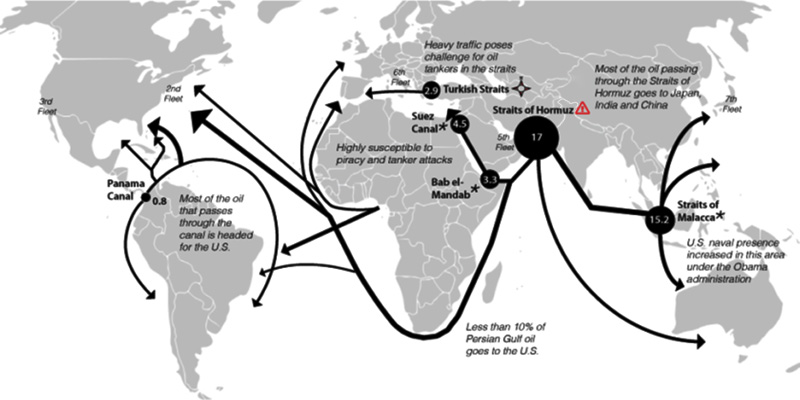International Relations
A Secure Indian Ocean
- 09 Aug 2021
- 6 min read
Why in News
Recently, India has proposed to convene an open debate of the UN Security Council (UNSC) on enhancing maritime security.
- The objective of this debate is to highlight effective international maritime cooperation to respond holistically to natural and manmade threats to maritime security.
- It also reflects India’s international evolution as a maritime nation.
Key Points
- Importance of Indian Ocean for India:
- Long Maritime Boundary: With a coastline of over 7,500 km, India has a natural interest in enhancing maritime security.
- Securing Sea lanes of Communication: In the Indian Ocean, three major Sea Lanes Of Communication (SLOCS) play a crucial role in the energy security and economic prosperity:
- SLOC connecting the Red Sea to the Indian Ocean through the Bab al-Mandab (that transports the bulk of Asia’s international trade with its major trading partners in Europe and America),
- SLOC connecting the Persian Gulf to the Indian Ocean through the Strait of Hormuz (transporting the bulk of energy exports to major import destinations like India, ASEAN, and East Asia),
- SLOC connecting the Indian and Pacific Oceans through the Straits of Malacca (integral to the smooth flow of trade with ASEAN, East Asia, Russia’s Far East and the US).
- The Indian Ocean region transports 75% of the world’s maritime trade and 50% of daily global oil consumption.
- India’s Maritime Initiatives:
- Disaster Management: The fallout of the 2004 tsunami, which took a heavy toll on human and natural resources, led to the creation of an Indian Ocean Tsunami Warning and Mitigation System by the UN in 2005.
- Through this, an international network seeks to prevent a recurrence of such devastation.
- Anti-Piracy Operations: Faced with the increased threat from piracy originating off the coast of Somalia since 2007 to shipping in the western Indian Ocean, the Indian Navy participated robustly as part of a UNSC mandated 60-country Contact Group on Piracy off the coast of Somalia.
- Security and Growth for All (SAGAR) Policy: India’s SAGAR policy is an integrated regional framework, unveiled by Indian Prime Minister during a visit to Mauritius in March 2015. The pillars of SAGAR are:
- India’s role as a net security provider in the Indian Ocean region (IOR).
- India would continue to enhance the maritime security capacities and economic resilience of friendly countries in IOR.
- A more integrated and cooperative focus on the future of the IOR, which would enhance the prospects for the sustainable development of all countries in the region.
- The primary responsibility for peace, stability and prosperity in the IOR would be on those “who live in this region”.
- Abiding by the International Law: India accepted an United Nations Convention for the Law of the Sea (UNCLOS) tribunal award on the maritime boundary arbitration between India and Bangladesh.
- It envisaged contributing a new impulse to effective international economic cooperation among the littoral states of the Bay of Bengal (BIMSTEC).
- Data Sharing: Sharing data on threats to commercial shipping is an important component of enhancing maritime security.
- In this context, India established an International Fusion Centre (IFC) for the Indian Ocean region in Gurugram in 2018.
- IFC is jointly administered by the Indian Navy and Indian Coast Guard.
- IFC serves the objective of generating Maritime Domain Awareness on safety and security issues.
- Disaster Management: The fallout of the 2004 tsunami, which took a heavy toll on human and natural resources, led to the creation of an Indian Ocean Tsunami Warning and Mitigation System by the UN in 2005.
Way Forward
- International Cooperation: Sustaining international cooperation to enhance maritime security requires two supportive frameworks in the policy and operational areas.
- Rule-of-law Based Approach: There is a need to review the operational effectiveness of the UNCLOS.
- Especially regarding the enforcement of its provisions on freedom of navigation, the sustainable exploitation of maritime resources, and the peaceful resolution of disputes.
- Securing the Sea Lanes of Communication: Securing SLOCs that traverse the oceans is of central importance to enhancing maritime security.
- Thus, the global debate must focus on ensuring equal and unrestricted access to SLOCs by states while resolving differences through peaceful means.
- Rule-of-law Based Approach: There is a need to review the operational effectiveness of the UNCLOS.
- Engaging Private Sector: There is a need for an increasing role of the private sector in the maritime domain, whether it is in shipping, sustainable development through the Blue Economy.
- Further, the use of the maritime domain can be leveraged to provide the critical submarine fibre-optic cables supporting the Digital Economy.
- The ability of the UNSC to respond to the debate by endorsing a multiple stakeholder approach to enhancing maritime security would be a significant outcome, setting a paradigm for upholding “multi-dimensional” security in the 21st century.





